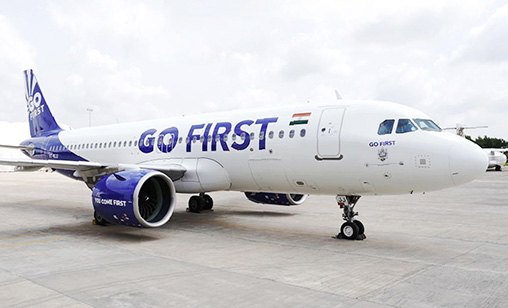News Backgrounder
Go First shutdown sends tremors through airline leasing industry
June 1st 2023
Aircraft manufacturers and lessors continue to be concerned about an order issued by an Indian government authority that bars aviation lessors from repossessing aircraft from bankrupt local carrier, Go First. Read More » The airline grounded its fleet on May 3.
Lessors have lodged applications with India’s Directorate General of Civil Aviation to repossess more than 40 of the airline’s 54 planes. At least three lessors - SMBC Aviation Capital, SFV Aircraft Holdings, and GY Aviation Lease - have appealed a decision issued by the National Company Law Appellate Tribunal (NCLAT) on May 10.
 |
On May 22, the NCLAT upheld insolvency resolution proceedings against the crisis hit airline, derailing efforts of aircraft lessors to take possession of their aircraft from the struggling carrier that is controlled by India’s Wadia Group.
A two-member NCLAT bench directed aircraft lessors and the Interim Resolution Professional (IRP) of Wadia Group to approach the National Company Law Tribunal (NCLT) about the claim of possession and other respective claims relating to aircraft whose leases were terminated by the lessors after the company filed for insolvency.
Boeing also has expressed concern about the impact on aircraft lease rates in India if the order continues to stand. Some 88% of the 673 commercial planes in the fleets of Indian carriers were on lease as on May 3 according to aviation analytics consultancy Cirium’s data. With leasing being such a critical part of India’s airline scene – more than 2,200 new aircraft are scheduled to be delivered to the country’s carriers in the next two decades – lessors are appealing for the matter to be resolved.
Boeing Commercial Airplanes vice president sales and marketing for India, Ryan Weir, when asked if aircraft lease rates for India’s airlines will increase due to the NCLT order, he told local media: “It is probably too early to comment on the outcome. We are concerned about what will happen with lease rates if the current order stands,” he said.
“Pushing the Cape Town treaty through legislation is the single most important act India can do to appease the lessors and create a framework that works. It has proven to work in other jurisdictions. Once it is ratified, it will do the same thing in India.
“In doing so, lessors will be provided more comfort in placing their extremely expensive assets in the country.”
In 2008, India signed the Cape Town Convention (CTC) and Protocol, an international treaty framed to reduce risk for aircraft lessors and financiers. India introduced a Bill in 2018 and a new Bill in 2022 to implement the CTC, but it has not been passed by Parliament.
Weir added: “I don’t think we know what the impact is going to be (due to Go First’s situation). It is an unfortunate set of circumstances for airlines, lessors and the travelling public. We are certainly working very closely with our customers to identify and discuss any impact of the court rulings. We are working with lessors to understand their perspective as well.”
After filing an insolvency application with the NCLT, Go First ceased flying. The airline has placed blame for its cash crunch squarely at the feet of engine manufacturer Pratt & Whitney, declaring almost 50% of its fleet was grounded by delays in the supply of engines to the airline.
SMBC Aviation Capital, in its application before the NCLAT, said “lessors and international aircraft owners see India as a risky jurisdiction for aircraft leasing”.
At press time, Go First’s commitment to resume a slimmed down flying schedule “shortly” had yet to be honored. Industry analysts believe the LCC has too many obstacles to overcome to return to flying any time soon.
megan moroney says:
January 27th 2024 12:28pm